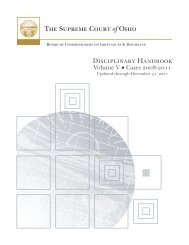The Joint Committee to Study Court Costs and ... - Supreme Court
The Joint Committee to Study Court Costs and ... - Supreme Court
The Joint Committee to Study Court Costs and ... - Supreme Court
Create successful ePaper yourself
Turn your PDF publications into a flip-book with our unique Google optimized e-Paper software.
RECOMMENDATIONS<br />
1. <strong>Court</strong> costs should be reasonable, nominal <strong>and</strong> directly related <strong>to</strong> the<br />
operation <strong>and</strong> maintenance of the court.<br />
"<strong>The</strong> real practical blessing of our Bill of Rights is in its provision for<br />
fixed procedure securing a fair hearing by independent courts <strong>to</strong><br />
each individual. ...But if the individual in seeking <strong>to</strong> protect himself<br />
is without money <strong>to</strong> avail himself of such procedure, the<br />
Constitution <strong>and</strong> the procedure made inviolable by it do not<br />
practically work for the equal benefit of all. Something must be<br />
devised by which everyone, however lowly <strong>and</strong> however poor,<br />
however unable by his means <strong>to</strong> employ a lawyer <strong>and</strong> pay court<br />
costs, shall be furnished the opportunity <strong>to</strong> set fixed machinery of<br />
justice going."<br />
William Howard Taft, Chief Justice, U.S. <strong>Supreme</strong> <strong>Court</strong>, Preface <strong>to</strong><br />
Smith <strong>and</strong> Bradway, LEGAL AID WORK IN THE UNITED STATES<br />
(1926)<br />
<strong>Court</strong>s provide a forum for the fair <strong>and</strong> just resolution of disputes. <strong>Court</strong>s<br />
not only provide a service for those who file claims, but are the foundation for the<br />
peaceful resolution of disputes. For this reason, there should be no cost <strong>to</strong><br />
accessing justice other than a nominal fee <strong>to</strong> cover expenses of administering<br />
the case.<br />
<strong>Court</strong> costs <strong>and</strong> fees cannot <strong>and</strong> should not be considered “income” <strong>to</strong> a<br />
court. Any requirement for a court <strong>to</strong> fund itself through the levying of fines, fees<br />
or costs <strong>to</strong> operate can only encourage corruption. If a court is forced <strong>to</strong> be selfreliant,<br />
then either heavier penalties will be imposed or courts will be required <strong>to</strong><br />
increase costs <strong>and</strong> fees in order <strong>to</strong> pay for operations. This would lead <strong>to</strong> an<br />
system inaccessible <strong>to</strong> all but those who can pay.<br />
Finally, costs <strong>and</strong> fees should not be used <strong>to</strong> fund any special interest, but<br />
should be used <strong>to</strong> fund justice system programs leading <strong>to</strong> an efficient <strong>and</strong><br />
effective judicial system. <strong>The</strong> General Assembly has enacted court costs <strong>and</strong><br />
filing fees <strong>to</strong> fund programs not directly related <strong>to</strong> the overall administration of<br />
justice. In addition, there has been a trend in recent years <strong>to</strong> grant county<br />
commissioners discretion in imposing a court cost for various programs, including<br />
Crime S<strong>to</strong>ppers <strong>and</strong> regional justice information systems. Although these<br />
programs are all worthwhile, funding them through court costs perpetuates the<br />
perception that court costs are, in reality, a tax upon citizens that is not enacted<br />
by the General Assembly. <strong>Court</strong> users should not bear the burden of funding<br />
these non-judicial programs. If a program is meri<strong>to</strong>rious <strong>and</strong> deserves funding by<br />
4
















